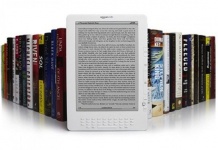 Most of the focus in the ebook world is usually on you and me, the individual person. From the hardware we purchase to the ebooks we buy, vendors and other digital providers are continually working to gain our interest. However, from a library point of view, things are completely flipped. By necessity, we librarians work with multiple users on a daily basis, anywhere from 5 to 500 different individuals. As such, any ebook purchase for the library takes on far more implications. As much I would like, libraries simply don’t have the budget to purchase ebook readers for everyone, leaving us in a dilemma. What does my library do? How do I as a librarian bring the ebook world to my patrons? For some of us, the answer is OverDrive.
Most of the focus in the ebook world is usually on you and me, the individual person. From the hardware we purchase to the ebooks we buy, vendors and other digital providers are continually working to gain our interest. However, from a library point of view, things are completely flipped. By necessity, we librarians work with multiple users on a daily basis, anywhere from 5 to 500 different individuals. As such, any ebook purchase for the library takes on far more implications. As much I would like, libraries simply don’t have the budget to purchase ebook readers for everyone, leaving us in a dilemma. What does my library do? How do I as a librarian bring the ebook world to my patrons? For some of us, the answer is OverDrive.
Overwho? OverDrive
Located in Cleveland Ohio, OverDrive is a major player in the world of ebooks as well as other forms of digital media. Perhaps not as well known by individual consumers, OverDrive strikes partnerships with both publishers and libraries, becoming a “middleman” of sorts between them and providing access to digital materials for library patrons and other customers of their services. A good example of this can be found here in Ohio with Digital Downloads. This project includes both OverDrive and several libraries such as the Columbus Metropolitan Library, Grandview Heights Public Library, Greene County Public Library, and others. So what?
Using Digital Downloads as our example, patrons can successfully check out ebooks of several types from Adobe PDF to ePub and even some digital music and video. Using my Sony PRS-505, I’ve been able to catch up on several new titles that I would have had to wait for on reserve otherwise. However, the selection has been slim at times due to budgetary cutbacks in the state or popularity of the titles, and even the unfortunate hassle of DRM, which is included in the resources provided. It’s not a perfect solution by any means, but it’s a start.
What can libraries do?
Even with the success of the project here in Ohio, there’s still a fundamental disconnect in the public library world. Should libraries focus on print, to the detriment of digital? Or should they go all out for digital and risk leaving some of their patrons behind? With uncertain funding and the digital ebook world still evolving, there are no hard and fast answers. My thoughts are that OverDrive with a mix of Google Books, Internet Archive titles, and Project Gutenberg might be one way to approach the dilemma.
Your thoughts?
How about your library? Have you seen OverDrive in action at it? Does your library even offer to download titles, music, videos, etc? What if your library used some of its book budget and devoted it to OverDrive resources? That would take away from the regular book budget—would you support that? Or do you think projects such as Google Books would be a better way for your library to focus its efforts on? Let us know your thoughts.
Editor’s Note: Tony Bandy is a librarian with a background in history and writing, he is currently freelancing and active in the field of library technology training via his company Library Knowledge. You can find his writings in Discovering Family History, Internet Genealogy as well as his blog, Adventures In History. You can reach Tony via Twitter (@LibKnowledge) or email: tony at libraryknowledge.com. PB


































The St. Louis County Library implements Overdrive. Unfortunately the books won’t work on my Kindle, but I do read them using the Adobe digital book software on my Mac. The selection at my library is very good.
I tried a video once, but it actually created a temporary burn-in on my LCD TV. Eventually it went away after a couple of weeks. I chatted with the Overdrive folks, and they were looking into it, but won’t access any of the videos.
I haven’t tried the audio selections yet.
I think this is a good use of funds for libraries, but I think they also need to track usage and ensure the patrons are getting best value.
In someways, it’s a superior offering because I can read mysteries without smoke wafting up from the pages (a lot of smokers in Missouri).
I also think anything that encourages to actually read a book nowadays (and not just weblogs, no offense, or Twitter) is a good thing.
It’s funny, but my library is like millions of others across the country–one story building, with crowded book shelves, and a kid’s area, computers, and looking like it was built in 1960’s (like so many do). It’s a little dingy, and plain, and hasn’t changed much from the library we went to decades ago.
But where it matters, it’s lightyears ahead. eBooks, free wifi, computers, can check out music and DVDs, request new books and they’re usually purchased if the book has any redeeming value, free classes and rooms where the community can hold meetings–rather than waste time on a pretty new building, the money went where it makes sense. We have very forward thinking librarians in our community. We’re lucky that way.
The Hennepin County Library system (in MN) uses OverDrive and NetLibrary for digital services. Unfortunately while they offer tons of audiobooks, videos & music the only ebooks they offer are a small number of non-fiction PDF’s from NetLibrary. So far they won’t even answer questions as to if/when they might offer fiction titles from OverDrive. 🙁
Seattle’s public library system offers ebooks and audio books online, but what you can do with them is so limited and inconsistent, I’ve not bothered to use it, particularly since their support for Macs and iPods has been so sketchy in the past. Maybe things have changed, but a few years ago I got the impression that OverDrive was rather clueless about technology and surviving simply because librarians didn’t have anywhere else to go.
My suggestions:
1. Create software that makes digital downloads as easy and predictable as purchasing a book in iTunes. Integrate the download option into your catalog, so getting an ebook is easier than putting a hold on a printed copy.
2. Take advantage of the public domain. Create a consortium that creates and shares audio and epub versions of popular works in the public domain. I suspect the costs would be more than covered by the savings in purchasing, replacing and processing in-and-out physical copies. You might even want to contract out the production, offering freelancers a micropayment every time their nicely formatted or nice read version of Pride and Prejudice is checked out.
3. And finally, as an author, I’d suggest you support a micropayment system that authors would appreciate. Most authors would be quite happy to replace the iffy, up-and-down income from selling physical copies with a unending income stream from a per-uset fee of a few cents every time a book is checked out.
And don’t think that this will cost money. It could very well save money. Big city libraries should pay particular attention to the money they’re now spending on holds: picking books from the shelves and transferring them from one library to another. I suspect that digital checkout with micro-payments to authors (or those formatting public domain works) would be much cheaper than the processing of printed copies though all the branches of a typical metro-library system.
As people get more familiar with computers, they’ve begun to put holds on books, wherever they are in a library system, rather than just check out what is on the shelves. I’ve seen the hold shelves in Seattle’s libraries grow and grow over the past ten years. Filling those shelves costs money.
As a librarian in a public library which belongs to an OverDrive consortium, I can say that our patrons are not interested in public domain ebooks. I’m happy that OverDrive is there to provide ebook bestsellers in the library lending model. They worked for years to get publishers to offer their audiobooks in iPod-compatible form–I would hardly call them “clueless about technology.” They provide catalog records so that ebooks are listed in our catalog with direct links to the download site. Their offerings keep getting better and better in audiobooks and ebooks, based on their skill in getting publishers to sign on with them. I look forward to a lot more usage of this collection with the explosion in ebook readers. I agree that ebooks save libraries money in the long run.
I think ebooks are perfect for mass-market fiction titles because these can get so mangled from repeated use that they have to be replaced; ebooks hold up better and I know one person involved in our library system has also pointed out that they are cheaper because they don’t need to invest people-time in cataloguing, shelving, re-shelving and maintaining them. I think library funds for paper books should go to non-fiction reference materials, hardbacks of literature (i.e. not genre romance and mystery but books which will be relevant and useful for years and years by quality authors) and things like language kits (which are very popular in our library system).